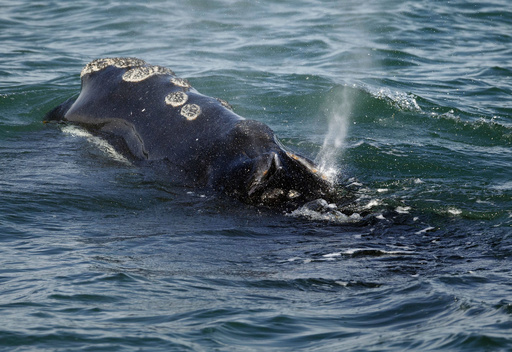Scientists studying a critically endangered whale species off the coast of New England have reported promising initial signs indicating a potentially successful feeding and breeding season for these majestic creatures.
The North Atlantic right whale, one of the rarest whale species globally, is estimated to have a population of around 370 individuals. These massive whales migrate to Cape Cod Bay in Massachusetts, typically arriving early in winter and residing there until mid-May.
Researchers from the Center for Coastal Studies in Provincetown, Massachusetts, noted the sighting of the season’s first two right whales in the bay on November 18. Observations indicated that these whales were discovering a rich food source, engaging in feeding on tiny organisms near the water’s surface—a behavior uncommon this early in the season.
Water samples taken along the path of the right whales revealed a mix of microscopic crustaceans, a favorite food for the whales. Christy Hudak, a researcher at the center, identified one crustacean species, Calanus finmarchicus, as particularly significant due to its high oil content, which is vital for the health of the whales. Hudak mentioned, “Though Calanus was not the dominant species in the sample, its elevated numbers at this time of year are unusual. It will be interesting to see if this year’s food availability leads to a particularly successful season for the right whales in Cape Cod Bay.”
The presence of plentiful food in waters off New England marks the second positive development for right whales in recent weeks. A separate group of researchers reported in October that the population of these whales had grown by approximately 4% between 2020 and 2023.
Despite this growth, the right whale population experienced a substantial decline of around 25% from 2010 to 2020, raising alarms about the species’ risk of extinction among scientists and conservationists. Conservationists emphasize that, despite recent hopeful signs, the species requires urgent protection, with fewer than 70 reproductively active females remaining, according to a statement from the Clearwater Marine Aquarium.
The whales face significant threats, including entanglement in commercial fishing gear and collisions with large vessels. Additionally, scientists contend that rising ocean temperatures have driven the whales from designated protected areas in their quest for food, exposing them to greater risks.
Historically, these whales thrived off the New England coast, but their numbers were drastically reduced during the era of commercial whaling.



